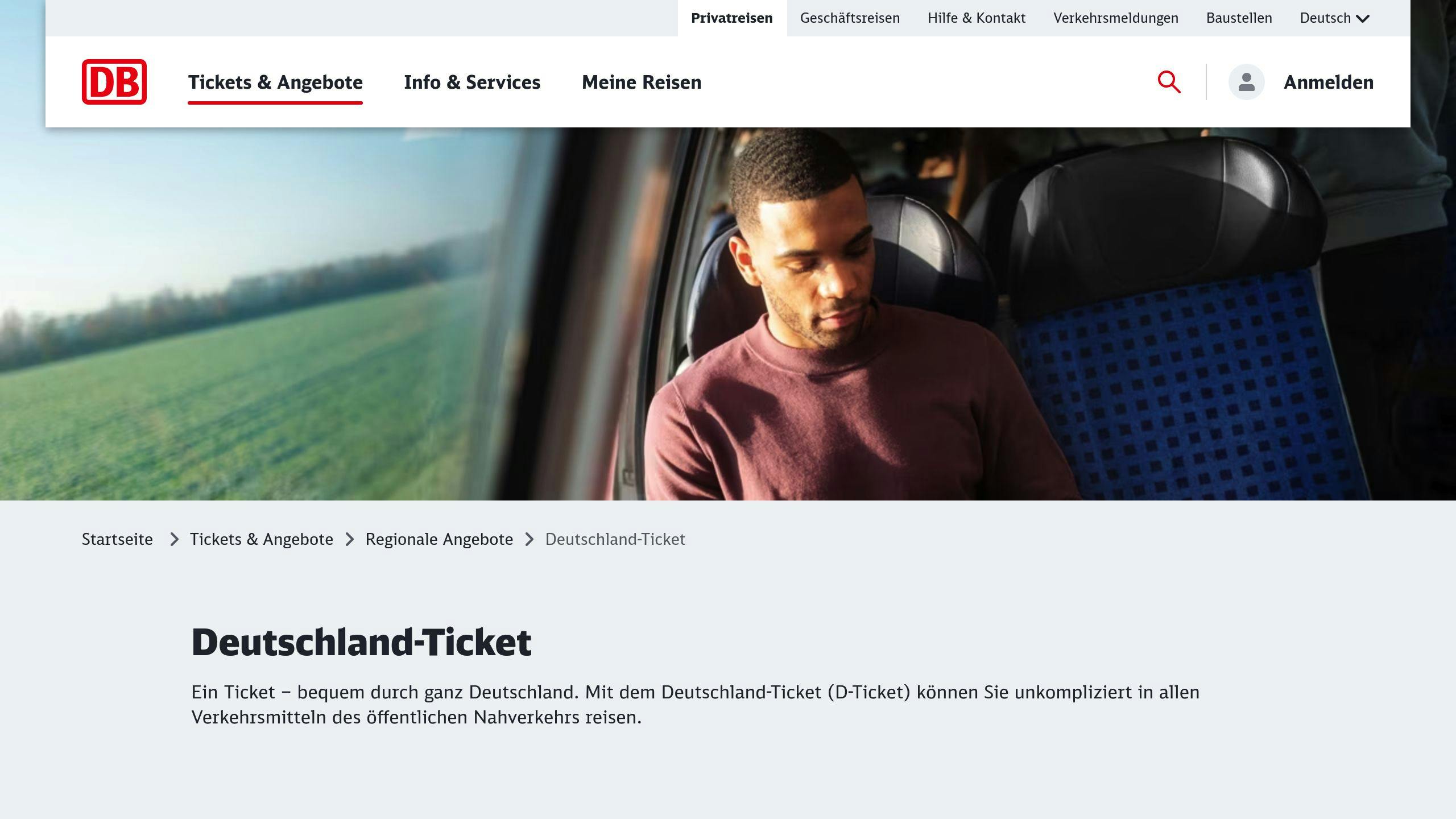Deutschlandticket vs. regular monthly ticket: cost comparison
The Deutschlandticket for €58 per month offers nationwide use of local transport and is therefore often cheaper than local monthly tickets. It is particularly worthwhile for commuters with supra-regional routes or high ticket costs in their city. Regular monthly passes are sometimes cheaper, but usually only offer regional validity. Here is a quick comparison:
| Ticket type | Ticket price | Scope of application | Advantages | Disadvantages |
|---|---|---|---|---|
| Germany ticket | 58 € | All of Germany | Flexibility, can be canceled monthly, digital | No carry-on, no 1st class |
| Monthly ticket (e.g. Berlin AB) | 86 € | Local/Regional | Carry-on option, often cheaper locally | Limited use, often longer commitment |
Conclusion: The Deutschlandticket is ideal for interregional commuters or cities with high ticket prices (e.g. Cologne, Frankfurt). Local tickets can be cheaper if you are only traveling in one city.
Deutschlandticket: Price rises to 58 euros in 2025 – What does this mean for passengers?

Germany ticket: €58 for nationwide useThe Deutschlandticket costs €58 per month and offers access to all public transportation in Germany. This includes buses, streetcars, S-Bahn trains and regional trains [1][3]. It is available both digitally via an app and as a physical card.
Regular monthly passes: differences depending on the city
The prices for regular monthly travelcards vary considerably depending on the city. In Munich, a monthly pass for the M zone costs €59.10, while in Cologne, including Bonn, the price is €130. These differences depend on factors such as network size, regional economic power and transport policy [2].
Comparison: Deutschlandticket and regular monthly passes
A look at the price differences shows how much the costs vary from region to region:
| City | Germany ticket | Regular monthly ticket | Savings per month | Area of validity regular card |
|---|---|---|---|---|
| Munich | €58 | €59,10 | €1,10 | M-Zone |
| Cologne | €58 | €130 | €72 | City area incl. Bonn |
Commuters in Cologne save up to €72 per month with the Deutschlandticket. Even in Munich, where the difference is only €1.10, the ticket offers a decisive advantage: the significantly larger area of validity.
While regular monthly tickets are often limited to individual zones or urban areas, the Deutschlandticket allows you to travel to other regions without incurring additional costs. This makes it particularly interesting for people who want to travel flexibly.https://app.seobotai.com/banner/inline/?id=sbb-itb-5b973fe
Cost analysis by commuter type
City commuters
The costs for city commuters depend heavily on the fare system of the respective city. In Berlin, commuters pay €86 for a monthly AB ticket, whereas with the Deutschlandticket, which costs €58, they save €28 per month. The difference is smaller in Munich, where commuters only save €1.10 per month. The Deutschlandticket in Hamburg is particularly interesting: the regular HVV monthly ticket for the rings A-B costs €95.70, which means commuters can save €37.70 per month.
Interregional commuters
The Deutschlandticket offers considerable financial benefits for commuters traveling between cities. One example: the Frankfurt-Mainz route. The regular monthly ticket here costs €199.90, while the Deutschlandticket costs €58 and offers a monthly saving of €141.90. The advantage is even clearer in the Rhine-Ruhr area: commuters between Düsseldorf and Dortmund normally pay around €230 per month. With the Deutschlandticket, they save a whopping €172 per month.
Occasional users
The Deutschlandticket can also be worthwhile for occasional users. In Berlin, the ticket pays for itself from 7-8 travel days per month. In Frankfurt, where a regular monthly ticket costs €95.50, the Deutschlandticket remains the cheaper choice at €58, even when used three times a week.
Overview of savings by commuter type
| Commuter type | Regular monthly costs | Savings with Deutschlandticket |
|---|---|---|
| City commuter (Berlin AB) | €86 | €28 |
| Regional commuter (Frankfurt-Mainz) | €199,90 | €141,90 |
| Intercity commuter (Düsseldorf-Dortmund) | €230 | €172 |
The examples illustrate this: The longer the commute, the greater the savings. In addition to the financial benefits, the Deutschlandticket also offers practical advantages that can make everyday life easier for commuters.
Other factors to consider
Cancellation periods and flexibility
While classic subscriptions such as the Berlin VBB ticket often tie users in for a whole year, the Deutschlandticket can be canceled on a monthly basis. This monthly option gives users more freedom and prevents long contract commitments, which indirectly also saves costs.
Additional benefits: Sharing services and upgrades
The Deutschlandticket offers practical additional services, especially in the area of shared mobility. In Hamburg, for example, ticket holders benefit from 30 free minutes per journey with StadtRAD.
Deutschlandticket:
- First class: Only bookable as individual upgrades
- Transferability: Not possible
- Carriage: Depending on regional regulations
Regular tickets:
- First class: Often available as a permanent option
- Transferability: Often permitted outside peak times
- Carriage: Usually included, depending on the fare
Digital access and payment options
Another difference lies in digital use. The Deutschlandticket is only available digitally, via apps such as the DB Navigator or regional transport association apps. Modern payment options such as Apple Pay and Google Pay are also supported.
The digital availability of regular monthly tickets depends on the respective transport association. In cities such as Munich or Berlin, digital solutions are often available, while smaller cities still rely on paper tickets. The digital version also has an advantage: there are no additional costs if the ticket is lost, as it can simply be transferred to a new device – a clear advantage over physical tickets, which often incur fees for replacement tickets.
“The Deutschlandticket is not just a ticket, but a revolution in local public transport that offers commuters unprecedented flexibility and additional benefits.” – Volker Wissing, Federal Minister of Transport
Conclusion: The right ticket choice
Advantages and disadvantages at a glance
Ticket option Advantages Disadvantages Germany ticket – Valid throughout Germany
– Can be canceled monthly
– Unit price of €58
– Digital use– No additional passengers
– No 1st class option
– More expensive than local tickets in cities like MunichRegular monthly ticket – Often cheaper for local journeys
– Additional local benefits
– Carriage regulations
– 1st class options– Can only be used regionally
– Longer contract periods
– Higher costs for supra-regional useThe table shows: Choosing the right ticket depends heavily on how and where it is used. The following recommendations provide guidance.
Recommendations according to user type
The Deutschlandticket is ideal for commuters who regularly travel between cities or federal states, for example in the Rhine-Ruhr area or between Frankfurt and Mainz. As soon as the monthly costs for journeys outside the local tariff exceed the €58 mark, this ticket becomes the cheaper choice.
For people who only travel in large cities such as Munich or Hamburg, a regular monthly ticket may be more suitable. It is worth looking at local options, especially if benefits such as take-along regulations or the use of 1st class are relevant.
Outlook for future developments
The price increase of the Deutschlandticket to €58 from January 1, 2025 shows that adjustments are part of the strategy. Plans include more flexible fare models and additional sharing offers that could make the ticket even more attractive. It remains important to check your own needs annually in order to make the best choice.

PAUSE-BUTTON
Pause whenever you want.
New
Pause your subscription up to 24 hours before the end of the month with just one click.
Fully flexible
Pause whenever you want. Without annoying notice periods.
Only pay when you use the ticket.
Great for short-term use, vacations, or occasional commutes.